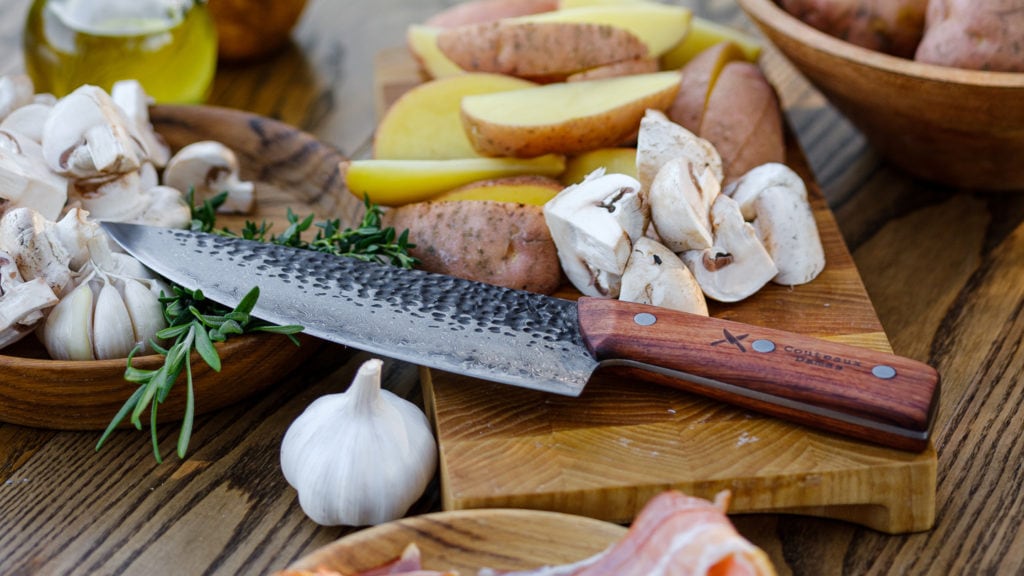Choosing the right kitchen knives can be a challenge for professionals. Among the most debated options are Damascus knives and stainless steel knives, each boasting unique qualities that chefs deeply appreciate. Understanding the distinctions between these two types is essential for any culinary expert looking to find the ideal tool for their kitchen tasks.
For centuries, the allure of Damascus steel has captivated both chefs and collectors. Its distinctive patterned design makes these knives stand out, embodying both functionality and artistry. In contrast, stainless steel knives are celebrated for their durability, ease of upkeep, and versatility. In this guide, we will examine the key characteristics of both types of knives and assist you in making an educated choice.

A Glimpse Into the History of Damascus Steel
The roots of Damascus steel reach back to ancient history, initially utilized for sword-making. These blades were highly valued for their strength and capacity to maintain a sharp edge. The term Damascus is thought to originate from the capital of Syria, formerly a major center for steel trade. Craftsmen perfected the technique of folding and forging steel, resulting in the stunning wavy patterns we associate with Damascus knives today.
To gain insight into the rich history of Damascus steel and its influence on blacksmithing, check out this comprehensive article on [Damascus steel](https://science.howstuffworks.com/damascus-steel.htm).
Stainless Steel: A Contemporary Marvel
Stainless steel is a more recent innovation compared to Damascus steel, emerging in the early 20th century. This alloy, made from iron, chromium, and other elements, offers remarkable resistance to rust and corrosion. This quality makes stainless steel knives particularly attractive for culinary professionals who value cleanliness and convenience in busy kitchen environments.
The widespread use of stainless steel in kitchen cutlery has changed perceptions about knives. Its minimal maintenance requirements, along with excellent performance, have made it a favorite among chefs. For a more in-depth look at the benefits of stainless steel knives, refer to our detailed [knife comparison guide](https://knives.shop/blogs/my-blog/damascus-knives-under-200).
Performance: Edge Retention and Hardness
Edge retention and hardness are vital considerations for any kitchen knife. Traditionally, Damascus steel is celebrated for its sharpness and ability to maintain an edge over time. However, performance can vary among Damascus knives due to differences in craftsmanship and the technique used for layering.
Conversely, while stainless steel tends to have lower hardness compared to premium Damascus, it excels in uniformity and consistency. High-quality stainless steel varieties, such as VG-10 and AUS-10, offer impressive edge retention and resistance to tarnishing, making them a common choice in professional settings.
Maintenance: Care and Longevity
When it comes to upkeep, stainless steel clearly outshines Damascus. Its natural corrosion resistance simplifies maintenance, requiring little more than occasional sharpening and routine cleaning.
In contrast, Damascus knives necessitate more diligent care. To protect their intricate patterns and avoid rust, they should be hand-washed and dried promptly after each use. Regular oiling also helps preserve their elegance and sharpness. For expert advice on caring for Damascus steel, explore our [maintenance tips](https://knives.shop/blogs/my-blog/damascus-knife-maintenance).
Deciding as a Kitchen Professional
As a kitchen professional, you need to balance the aesthetic appeal of Damascus knives with the practicality and affordability of stainless steel options. If you appreciate a visually stunning blade and are prepared to invest the time to maintain it, a Damascus knife could be a worthwhile addition to your collection. However, if ease of use and functionality are your primary concerns, stainless steel may be the better choice.
Ultimately, the choice between Damascus and stainless steel knives relies on individual preference, intended use, and the willingness to commit to maintenance. Both styles present valuable advantages that can enhance your culinary creations.
Conclusion
Both Damascus and stainless steel knives are deserving of a place in any kitchen. By considering your specific requirements alongside the strengths of each knife type, you can select the perfect blade to elevate your culinary endeavors. For additional guidance on choosing the right knife for your kitchen, browse our [cutlery selection guide](https://knives.shop/blogs/my-blog/what-makes-a-good-steak-knife).

Frequently Asked Questions
What are the key differences between Damascus and stainless steel knives?
Damascus knives are distinguished by their beautiful patterns and sharpness, while stainless steel knives emphasize durability and low-maintenance care.
Which type of knife demands more upkeep?
Generally, Damascus knives require more maintenance to prevent rust and maintain their aesthetic appeal, whereas stainless steel knives are simpler to care for due to their resistance to corrosion.
Can stainless steel knives rival Damascus in performance?
Absolutely! High-quality stainless steel knives can deliver excellent performance with notable edge retention and user-friendliness, closely competing with top-grade Damascus knives.
This article contains affiliate links. We may earn a commission at no extra cost to you.


























